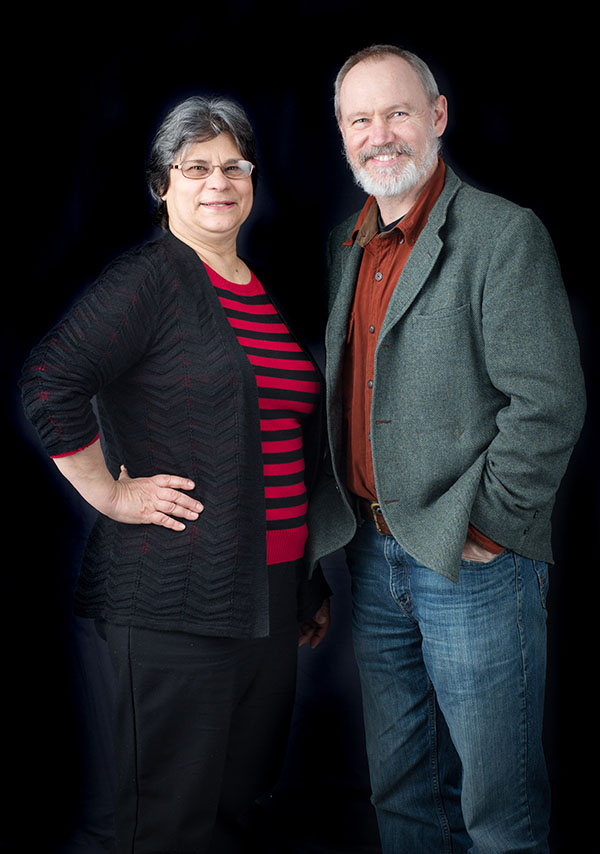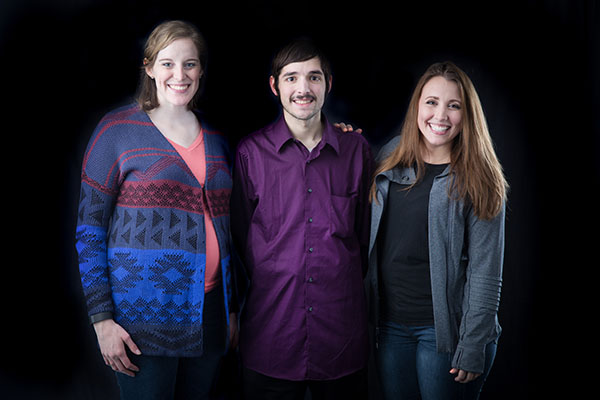
Appalachian faculty Dr. Angela Losardo, Department of Communication Sciences and Disorders, and Dr. Derek Davidson, Department of Theatre and Dance, combined their expertise to develop a therapeutic intervention for adolescents and young adults with autism and intellectual disabilities. Photo by Troy Tuttle
An interprofessional, exploratory pilot study by faculty members in the departments of Communication Sciences and Disorders and Theatre and Dance shows promise in improving the speech, language and social skills of adolescents and young adults with autism and intellectual disabilities. It also helped boost their self-confidence.
Appalachian State University’s Dr. Angela Losardo and Dr. Derek Davidson recently spent 20 weeks examining the efficacy of theatre as a therapeutic intervention for 15- to 25-year-olds with moderate to severe communication impairments, thanks to a grant from the Appalachian’s University Research Council (URC) and a research stipend from the Beaver College of Health Sciences.
Their study, titled the Theatre and Therapy Project, paired Appalachian students from each discipline with one of six participants. Everyone involved met weekly for two hours to work on specific communication goals by acting short scenes from their favorite movies. The goals were set in consultation with the participants and their families, and video recordings of several sessions helped document progress.
The activity-based intervention culminated in a drama presentation on campus in November titled “Stages of Success: The Power of Performance” starring six research participants, with casting and language support from Appalachian students.

Appalachian faculty Dr. Angela Losardo, Department of Communication Sciences and Disorders, and Dr. Derek Davidson, Department of Theatre and Dance, combined their expertise to develop a therapeutic intervention for adolescents and young adults with autism and intellectual disabilities. Photo by Troy Tuttle
The idea for such a study came to Losardo after seeing a friend’s adult son with Down syndrome present scenes from “Beauty and the Beast” at a local community center after taking drama classes. He showed remarkable improvement in his speech and social skills since taking the classes.
“He used to communicate much differently – head down, one word answers to questions, often unintelligible,” Losardo said about previous interactions with him. “When I saw him this time, he spoke with confidence and in complete sentences! I told my friend how amazed I was at how his communication had improved.”
Davidson’s and her study has shown similar results. Among the six participants, “we found improvements in speech and articulation, volume and intonation, their ability to work in groups and use of complete sentences, making eye contact and making friends,” Losardo said. They also improved in reading comprehension and cognitive skills, she said.
Watch segments of “Stages of Success: The Power of Performance,” presented by participants in a research study on the use of theatre as therapy for 15- to 25-year-olds with moderate to severe communication impairments.
Davidson said the opportunity to work with a marginalized population was beneficial for all involved. “The idea that theatre can make us better people has been around as long as theater has been around,” he told audience members at the performance. He added, “Theatre really is about community, and the greatest product of this pilot project has been the development of community. These young people have made gains in their speech and language abilities, but they’ve also joined a family.”
For Appalachian students, Losardo said students in the Department of Communication Sciences and Disorders learned new ways of infusing fun with therapy, while expanding their skills working with diverse populations. Davidson said students in the Department of Theatre and Dance strengthened their improvisational skills, which are much needed by teachers who also work with diverse populations.
Both Losardo and Davidson want their research to continue. Already plans are being made for similar activities in 2017, perhaps expanding the Appalachian majors involved and finding larger space in which to rehearse. Davidson said he’d like to see collaboration with the local non-profit In/Visible Theatre, which often presents the work of underrepresented voices.
“I really believe in the power of this,” Davidson said of the pilot study.
About the Department of Theatre and Dance
The Department of Theatre and Dance is one of seven departments housed in Appalachian’s College of Fine and Applied Arts. Its mission is to facilitate transformative experiences for students and the public, which cultivate compassionate, creative and collaborative communities through theatre and dance. The department also offers coursework for integrated learning through the arts to the general university student population. Its dynamic co-curricular production program provides exemplary theatre and dance experiences to departmental students, the university community and the region. Learn more at https://theatreanddance.appstate.edu.
About the Beaver College of Health Sciences
Appalachian State University’s Beaver College of Health Sciences (BCHS), opened in 2010, is transforming the health and quality of life for the communities it serves through interprofessional collaboration and innovation in teaching, scholarship, service and clinical outreach. The college enrolls more than 3,600 students and offers 10 undergraduate degree programs, nine graduate degree programs and four certificates across seven departments: Kinesiology, Nursing, Nutrition and Health Care Management, Public Health, Recreation Management and Physical Education, Rehabilitation Sciences, and Social Work. The college’s academic programs are located in the Holmes Convocation Center on App State’s main campus and the Levine Hall of Health Sciences, a state-of-the-art, 203,000-square-foot facility that is the cornerstone of Boone’s Wellness District. In addition, the college supports the Appalachian Institute for Health and Wellness and has collaborative partnerships with the Wake Forest University School of Medicine’s Physician Assistant Program, UNC Health Appalachian and numerous other health agencies. Learn more at https://healthsciences.appstate.edu.
About the College of Fine and Applied Arts
Appalachian State University’s College of Fine and Applied Arts is a dynamic and innovative group of seven academic departments, bringing together a variety of perspectives, experiences and real-world education to provide unique opportunities for student success. The college has more than 3,500 undergraduate and graduate majors. Its departments are Applied Design, Art, Communication, Military Science and Leadership, Sustainable Development, Sustainable Technology and the Built Environment, and Theatre and Dance. Learn more at https://cfaa.appstate.edu.
About Appalachian State University
As a premier public institution, Appalachian State University prepares students to lead purposeful lives. App State is one of 17 campuses in the University of North Carolina System, with a national reputation for innovative teaching and opening access to a high-quality, cost-effective education. The university enrolls more than 21,000 students, has a low student-to-faculty ratio and offers more than 150 undergraduate and 80 graduate majors at its Boone and Hickory campuses and through App State Online. Learn more at https://www.appstate.edu.
What do you think?
Share your feedback on this story.













